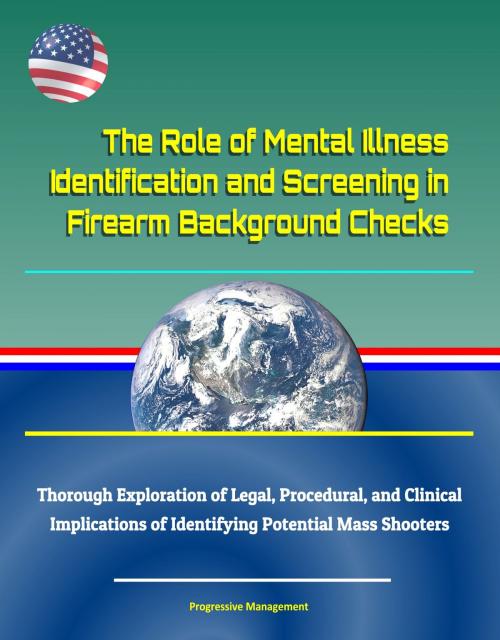The Role of Mental Illness Identification and Screening in Firearm Background Checks: Thorough Exploration of Legal, Procedural, and Clinical Implications of Identifying Potential Mass Shooters
Nonfiction, Social & Cultural Studies, Social Science, Crimes & Criminals, Murder, True Crime| Author: | Progressive Management | ISBN: | 9780463897430 |
| Publisher: | Progressive Management | Publication: | July 7, 2018 |
| Imprint: | Smashwords Edition | Language: | English |
| Author: | Progressive Management |
| ISBN: | 9780463897430 |
| Publisher: | Progressive Management |
| Publication: | July 7, 2018 |
| Imprint: | Smashwords Edition |
| Language: | English |
This important December 2017 report has been professionally converted for accurate flowing-text e-book format reproduction.
Highly publicized mass shootings, and often the corresponding commentary on the perpetrator's mental health, lead many to question how such a person could have acquired access to a firearm. Mental illness, broadly speaking, is a prohibiting criterion for individuals to purchase a firearm, yet there are several examples of individuals who have a history of mental illness and are able to legally pass a firearm background check. This thesis examines the tenuous relationship between mental illness and violence, and evaluates federal and state laws to assess the prohibited criteria. Individuals with mental illness who go untreated and have co-occurring disorders are at an increased risk of violence, yet may never enter into the courts or are not involuntarily committed to a mental institution. This research concluded, therefore, that statutes need to change by placing less emphasis on involuntary commitment to mental institutions and instead adopt a risk-based approach that restricts firearm access by individuals with a mental illness who may present a risk of violence once they are identified. Legal, procedural, and clinical implications are explored to ensure that individuals' Constitutional rights are protected while mitigating risk and maintaining a primary goal of ensuring effective treatment.
I. INTRODUCTION * A. PROBLEM STATEMENT * B. RESEARCH QUESTIONS * 1. Primary Research Question * 2. Secondary Research Questions * C. LITERATURE REVIEW * 1. Introduction * 2. Mental Illness and Violence * 3. Mental Illness and Firearm Background-Check Laws * 4. Conclusion * D. RESEARCH DESIGN * 1. Object of Study * 2. Selection Criteria and Rationale * 3. Study Limitations and Scope * 4. Instrumentation * 5. Steps of Analysis * 6. Output * II. MENTAL ILLNESS AND VIOLENCE: EXPLORING CURRENT GUN LAWS * A. INTRODUCTION * B. DISCUSSION OF MENTAL ILLNESS * C. RELATIONSHIP BETWEEN MENTAL ILLNESS AND VIOLENCE * D. LEGISLATION * E. CASE STUDIES * 1. Virginia Tech, 2007 * 2. Aurora, Colorado, 2012 * F. ANALYSIS * G. ASSISTED OUTPATIENT TREATMENT * H. CONCLUSIONS * III. PROCEDURAL IMPLICATIONS: FIREARM BACKGROUND CHECKS AND MENTAL HEALTH REPORTING * A. INTRODUCTION * B. BACKGROUND CHECKS * C. NICS OVERVIEW * D. NICS RECORDS * E. PRIVACY ISSUES * F. LEGAL ISSUES * G. CONCLUSIONS * IV. MENTAL-ILLNESS AND FIREARM RESTRICTIONS: IMPLICATIONS ON TREATMENT * A. INTRODUCTION * B. STIGMA * C. REINSTATEMENT OF RIGHTS * D. OTHER CONSIDERATIONS TO PROVIDE TREATMENT WHILE IMPROVING SAFETY * E. BEYOND BACKGROUND CHECKS * F. DUTY TO WARN? * G. CLINICAL IMPLICATIONS * H. CONCLUSIONS * V. CONCLUSIONS * A. FIREARM LEGISLATION * B. REPORTING * C. IMPACT TO TREATMENT * D. SUMMARY
This important December 2017 report has been professionally converted for accurate flowing-text e-book format reproduction.
Highly publicized mass shootings, and often the corresponding commentary on the perpetrator's mental health, lead many to question how such a person could have acquired access to a firearm. Mental illness, broadly speaking, is a prohibiting criterion for individuals to purchase a firearm, yet there are several examples of individuals who have a history of mental illness and are able to legally pass a firearm background check. This thesis examines the tenuous relationship between mental illness and violence, and evaluates federal and state laws to assess the prohibited criteria. Individuals with mental illness who go untreated and have co-occurring disorders are at an increased risk of violence, yet may never enter into the courts or are not involuntarily committed to a mental institution. This research concluded, therefore, that statutes need to change by placing less emphasis on involuntary commitment to mental institutions and instead adopt a risk-based approach that restricts firearm access by individuals with a mental illness who may present a risk of violence once they are identified. Legal, procedural, and clinical implications are explored to ensure that individuals' Constitutional rights are protected while mitigating risk and maintaining a primary goal of ensuring effective treatment.
I. INTRODUCTION * A. PROBLEM STATEMENT * B. RESEARCH QUESTIONS * 1. Primary Research Question * 2. Secondary Research Questions * C. LITERATURE REVIEW * 1. Introduction * 2. Mental Illness and Violence * 3. Mental Illness and Firearm Background-Check Laws * 4. Conclusion * D. RESEARCH DESIGN * 1. Object of Study * 2. Selection Criteria and Rationale * 3. Study Limitations and Scope * 4. Instrumentation * 5. Steps of Analysis * 6. Output * II. MENTAL ILLNESS AND VIOLENCE: EXPLORING CURRENT GUN LAWS * A. INTRODUCTION * B. DISCUSSION OF MENTAL ILLNESS * C. RELATIONSHIP BETWEEN MENTAL ILLNESS AND VIOLENCE * D. LEGISLATION * E. CASE STUDIES * 1. Virginia Tech, 2007 * 2. Aurora, Colorado, 2012 * F. ANALYSIS * G. ASSISTED OUTPATIENT TREATMENT * H. CONCLUSIONS * III. PROCEDURAL IMPLICATIONS: FIREARM BACKGROUND CHECKS AND MENTAL HEALTH REPORTING * A. INTRODUCTION * B. BACKGROUND CHECKS * C. NICS OVERVIEW * D. NICS RECORDS * E. PRIVACY ISSUES * F. LEGAL ISSUES * G. CONCLUSIONS * IV. MENTAL-ILLNESS AND FIREARM RESTRICTIONS: IMPLICATIONS ON TREATMENT * A. INTRODUCTION * B. STIGMA * C. REINSTATEMENT OF RIGHTS * D. OTHER CONSIDERATIONS TO PROVIDE TREATMENT WHILE IMPROVING SAFETY * E. BEYOND BACKGROUND CHECKS * F. DUTY TO WARN? * G. CLINICAL IMPLICATIONS * H. CONCLUSIONS * V. CONCLUSIONS * A. FIREARM LEGISLATION * B. REPORTING * C. IMPACT TO TREATMENT * D. SUMMARY















